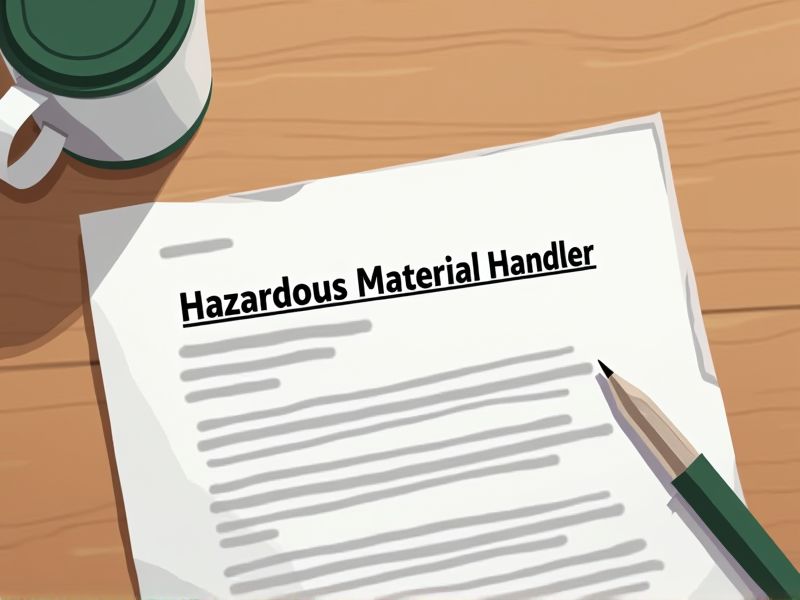
Hazardous Material Handlers deal with substances that pose risks to health, safety, and the environment, necessitating rigorous training standards. Certifications ensure these handlers understand proper handling, transportation, and disposal procedures to minimize potential hazards. Regulatory compliance requires specific certifications to align with legal safety requirements and industry best practices. Key certifications are crucial for any aspiring Hazardous Material Handler.
OSHA HAZWOPER 40-Hour Certification
OSHA HAZWOPER 40-Hour Certification is mandatory for handling hazardous materials due to the inherent risks involved. The certification ensures that workers receive comprehensive training to identify, evaluate, and control the exposure to hazardous substances. Proper certification reduces the likelihood of accidents and enhances safety measures at worksites involving dangerous materials. Employers benefit from reduced liability and compliance with federal regulations, which subsequently leads to safer work environments.
OSHA HAZWOPER 24-Hour Certification
OSHA HAZWOPER 24-Hour Certification ensures workers understand how to safely handle hazardous materials, reducing the risk of accidents and exposure. Employers comply with federal safety regulations by requiring this certification, avoiding potential legal issues and fines. Workers with this certification are better equipped to identify hazards, enhancing workplace safety and efficiency. The training provides critical skills for emergency response situations, limiting environmental and health impacts.
DOT Hazardous Materials Transportation Certification
DOT Hazardous Materials Transportation Certification ensures that hazardous material handlers are knowledgeable about safe transportation practices. Without certification, handlers may inadvertently violate federal regulations, leading to potential fines and penalties. Certified handlers are better equipped to prevent accidents and environmental damage during transport. Certification provides handlers with the credentials necessary to meet legal and industry standards, thereby promoting safe and efficient transportation of hazardous materials.
EPA Hazardous Waste Operations and Emergency Response Certification
The EPA Hazardous Waste Operations and Emergency Response Certification equips handlers with the knowledge necessary to manage hazardous materials safely, reducing potential health risks. Certification ensures compliance with federal regulations, which minimizes the risk of legal penalties and environmental fines. Trained handlers are better prepared to respond to hazardous spills or accidents, mitigating environmental impact. Certified professionals typically enhance workplace safety, which can lead to fewer incidents and associated costs.
IATA Dangerous Goods Regulations Certification
Hazardous material handlers need IATA Dangerous Goods Regulations Certification because it ensures they understand the international standards for safely transporting dangerous goods. Knowledge of these regulations reduces the risk of accidents during air transit. Proper certification helps organizations comply with legal requirements, thus avoiding penalties. Certified handlers contribute to the overall safety of airline operations by adhering to globally recognized protocols.
NFPA 472 Hazardous Materials Technician Certification
The NFPA 472 Hazardous Materials Technician Certification ensures a handler's competence in managing dangerous substances safely. Certification equips technicians with the skills to implement incident response protocols effectively, reducing the risk of accidents. Organizations achieve enhanced safety compliance and can mitigate liability issues with certified personnel on board. Improved preparedness from this certification can lead to faster resolution of hazardous material incidents, protecting both people and the environment.
GHS (Globally Harmonized System) Training Certification
GHS Training Certification ensures that hazardous material handlers understand standardized classification and labeling of chemicals, reducing risks of miscommunication. Proper training minimizes workplace accidents by equipping handlers with knowledge on safe handling procedures and emergency responses. Regulatory compliance is achieved through GHS certification, which harmonizes international safety standards for chemical management. Improved safety awareness from GHS training decreases the likelihood of exposure-related health issues for workers.
CBRN Response Certification
Hazardous material handlers face the risk of chemical, biological, radiological, and nuclear (CBRN) threats, which necessitates specialized training and certification. Proper CBRN Response Certification equips handlers with the skills to identify and manage these dangerous substances safely. Without this certification, response to such incidents could be delayed or ineffective, increasing potential harm to people and the environment. Certified handlers ensure compliance with regulations and enhance overall community safety during hazardous material incidents.
ISO 14001 Environmental Management Systems Lead Auditor Certification
Obtaining the ISO 14001 Environmental Management Systems Lead Auditor Certification enhances a Hazardous Material Handler's understanding of environmental regulations and compliance standards, which minimizes the risk of costly environmental violations. The certification equips handlers with the knowledge to implement effective environmental management practices, reducing the environmental impact of hazardous materials. This targeted expertise increases organizational confidence in the handler's ability to manage environmental risks responsibly. Certification can lead to career advancement opportunities as companies prioritize candidates who demonstrate a commitment to sustainability and regulatory adherence.
Emergency Response Coordinator Certification
Emergency Response Coordinator Certification equips hazardous material handlers with crucial skills to effectively manage and mitigate emergencies. Without this certification, response times may lag in critical situations, potentially leading to severe environmental and personal harm. Certification ensures familiarity with protocols and regulations, reducing the risk of accidents and fines. Improved competence among handlers promotes workplace safety and aligns with industry standards.
Summary
When you obtain certifications as a Hazardous Material Handler, your value in the job market significantly increases. Employers often prefer certified individuals, leading to enhanced job opportunities and potentially higher salaries. Your knowledge and skills in safely managing hazardous materials improve, reducing the risk of workplace incidents. This certification can also strengthen workplace safety culture and compliance.
